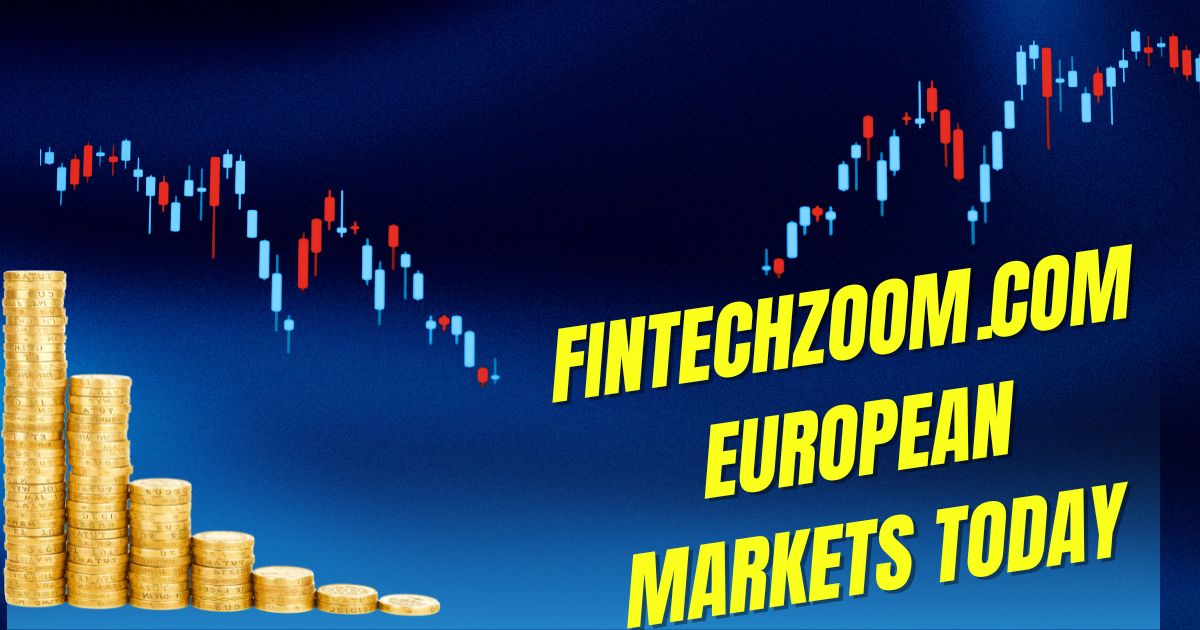Fintechzoom.com is a leading digital publication focused on financial technology, global stock markets, and investment trends. The platform is recognized for its timely and well-analyzed updates, especially when it comes to stock indices and financial markets across Europe. Whether you’re a casual investor or a market pro, Fintechzoom offers a user-friendly experience that helps break down complex trends into actionable insights.
Overview of European Markets Today
The European markets opened today with cautious optimism amid mixed global signals. Key indices such as the FTSE 100, DAX, and CAC 40 showed fluctuations influenced by inflation data, central bank policies, and geopolitical tensions. Investors are closely monitoring these developments for signs of economic stability and future growth potential.
Performance of the FTSE 100
The FTSE 100, the main index of the London Stock Exchange, saw modest gains early in the day. Gains in sectors like energy and banking supported the index, reflecting investor confidence in value stocks amid inflationary pressures. However, uncertainty around interest rates capped further momentum.
Germany’s DAX Market Movements
Germany’s DAX experienced mild volatility as investors digested recent earnings reports and ECB policy expectations. Tech and automotive sectors weighed down the index slightly, although pharmaceutical stocks provided some balance. Market participants are watching for signs of resilience in Europe’s largest economy.
France’s CAC 40 Reacts to Policy News
The CAC 40 moved sideways in response to mixed economic signals from the French government and the European Central Bank. The real estate and luxury goods sectors played a pivotal role in keeping the index relatively stable. Rising consumer prices continue to be a concern for both businesses and consumers in France.
Eurozone Inflation and Interest Rate Outlook
Inflation in the Eurozone remains above the European Central Bank’s 2% target, pushing the ECB to maintain a hawkish tone. The central bank’s approach to interest rate hikes continues to shape investor sentiment across Europe. Markets are pricing in a prolonged period of tight monetary policy, which could slow growth but tame inflation.
Impact of U.S. Market Trends on Europe
As European markets are heavily interlinked with global trading patterns, developments in the U.S. significantly influence investor behavior. A recent dip in Nasdaq tech stocks and mixed job data from the U.S. led to a cautious mood in European trading floors. Dollar strength has also affected European exports, placing additional pressure on manufacturers.
Energy Sector Drives Market Movement
Energy stocks in Europe saw an uptick, largely due to rising oil and gas prices amid geopolitical tensions and OPEC+ supply restrictions. Countries heavily reliant on energy imports are feeling the heat of higher costs, which is feeding into inflation figures and central bank reactions.
Technology Stocks Show Mixed Results
Tech stocks across Europe faced a pullback due to global concerns about overvaluation and earnings growth. While some firms benefited from AI and automation adoption, others lagged due to chip shortages and regulatory hurdles. Investors remain divided on whether this sector will see a short-term rebound or prolonged correction.
Banking Sector Stability Supports Indices
European banks have largely benefited from the rising interest rate environment, as it improves net interest margins. This has bolstered stock prices for major financial institutions. However, there is growing concern that higher borrowing costs could lead to defaults in the corporate and mortgage sectors.
Real Estate Feels the Pressure
Rising interest rates have dampened enthusiasm in the real estate sector. Developers are grappling with higher financing costs, and consumers are delaying purchases amid affordability concerns. This sector’s poor performance has acted as a drag on broader market indices, especially in cities like Berlin, Paris, and London.
Consumer Confidence Across Europe
Recent surveys show that consumer confidence remains shaky due to high living costs and economic uncertainty. Although retail spending held steady in some regions, a broader slowdown is evident, especially in southern European countries. This shift is being reflected in market performance for consumer goods and services.
Geopolitical Developments and Their Influence
The ongoing Russia-Ukraine conflict and tensions in the Middle East continue to cast a shadow over European markets. Energy supplies, refugee movements, and defense budgets are all factors being closely analyzed by market participants. These geopolitical risks contribute to overall volatility and cautious trading strategies.
Currency Movements and the Euro’s Position
The euro is trading within a narrow range against major currencies like the dollar and the pound. ECB’s policy direction has strengthened the euro temporarily, but global demand for safer assets like the dollar limits its upside. Currency fluctuations have a direct impact on export-heavy economies such as Germany and Italy.
Gold and Commodities as Safe Havens
Investors are increasingly looking toward gold and other commodities as safe havens amid market uncertainty. Gold prices have seen moderate gains, providing relief to portfolios affected by stock volatility. Commodity prices also play a key role in inflation trends, making them crucial indicators for future market movements.
Market Sentiment and Analyst Projections
Most analysts on Fintechzoom.com agree that the European market is currently in a consolidation phase. Volatility remains high, but opportunities are emerging for long-term investors. Sectors such as green energy, tech infrastructure, and sustainable finance are predicted to outperform in the coming quarters.
Future Outlook for European Stocks
Looking ahead, the trajectory of European stocks will largely depend on inflation trends, ECB actions, and global economic signals. There is potential for moderate growth if energy prices stabilize and consumer confidence improves. Market corrections may still occur, but strategic investing in stable sectors can yield consistent returns.
What Investors Should Keep in Mind
For everyday investors, staying informed through trusted platforms like Fintechzoom.com is essential. Diversifying portfolios, keeping an eye on central bank updates, and watching global cues can help navigate these unpredictable markets. Avoid emotional decisions and instead rely on data-driven insights.
Conclusion
European markets are influenced by inflation, interest rates, sector performance, and geopolitical currents, offering opportunities for cautious optimism and diversified investing to make informed decisions.
FAQs
What is Fintechzoom.com’s role in financial analysis?
Fintechzoom.com provides real-time updates and in-depth analysis on global financial markets, making it a go-to source for investors and analysts alike.
Why are European stock markets volatile right now?
Volatility stems from high inflation, interest rate hikes, geopolitical tensions, and shifting global demand, all contributing to market uncertainty.
Which European sectors are currently performing best?
Energy and banking sectors are showing relative strength, thanks to rising commodity prices and higher interest rates.
How does the ECB influence European market trends?
The European Central Bank sets interest rates and monetary policies, which affect borrowing, inflation, and overall market sentiment.
Is now a good time to invest in European stocks?
While risks remain, certain sectors like green energy and infrastructure may offer promising long-term growth opportunities.










